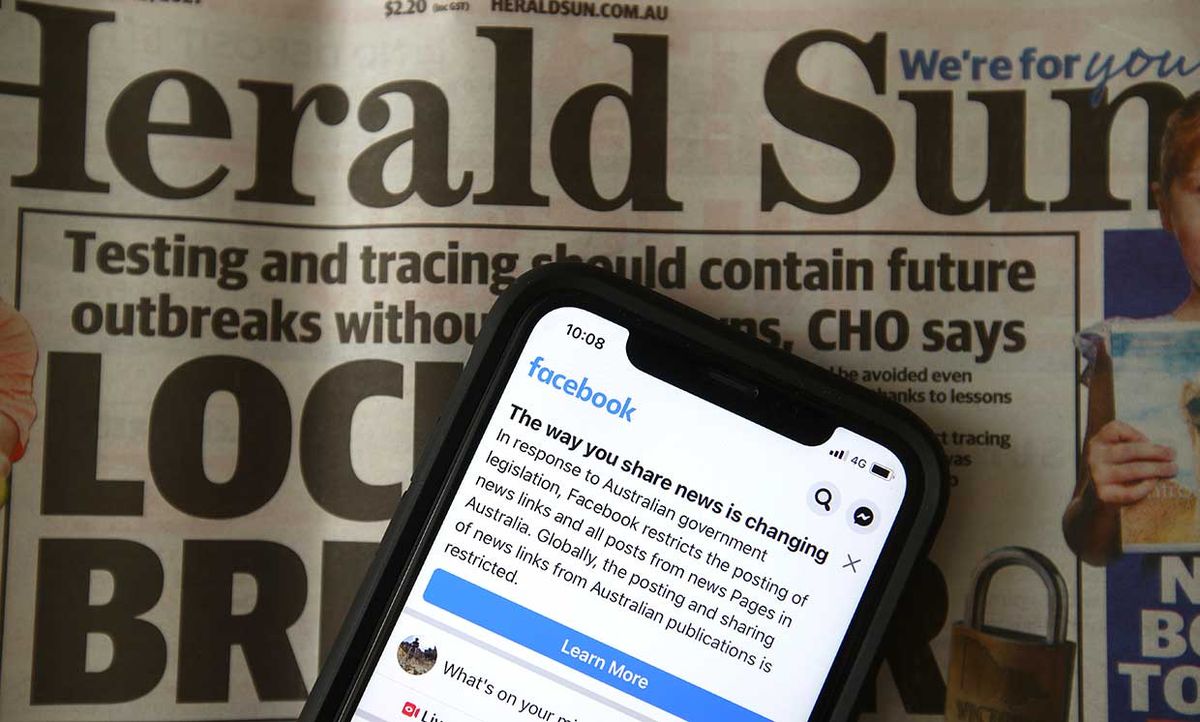Facebook users in Australia last week found they couldn’t access news and government web pages. That was by design. The social network removed these links in response to a proposed Australian government bill to require social media networks pay news organizations for use of their content. The ban on news access is actually part of a larger struggle between Facebook and media players like Rupert Murdoch’s News Corporation over the future of news content on social media.
That battle ended (for now) when an agreement was brokered after hurried bargaining resulted in the Australian government making concessions. Now, if digital platforms like Facebook and Google negotiate commercial deals with news organizations that can be shown to contribute “to the sustainability of the Australian news industry,” they could avoid being subject to the new law. In addition, the companies will receive at least one month’s notice before “a last resort” arbitration is proposed if such negotiations fail.
Plenty of questions, however, remain: Will Facebook consent to other countries enacting similar policy on them? What might other countries’ deals with other players (including Google and Microsoft) look like? And will any of this matter to Facebook and Internet users beyond Australia’s borders?
The answer to that final question, at least, is very likely Yes.
The battle began brewing back in April 2020 when the Australian government asked its Competition & Consumer Commission to draw up a news media bargaining code that would “address bargaining power imbalance between Australian news media businesses and digital platforms, specifically Google and Facebook.”
As the Media Code neared enactment, Google threatened in January to pull its search engine from Australia. In the same month, Mel Silva, managing director of Google Australia and New Zealand, stated before the Australian Senate Economics Legislation Committee that, “The principle of unrestricted linking between websites is fundamental to Search. Coupled with the unmanageable financial and operational risk if this version of the Code were to become law, it would give us no real choice but to stop making Google Search available in Australia.”
Australian prime minister Scott Morrison’s reply was immediate. “We don’t respond to threats,” he told the press the same day.
Microsoft, long-time competitor with Google and Facebook, was quick to exploit its rivals’ difficulties. After endorsing the government’s Media Code, Brad Smith, Microsoft president, wrote on his blog in February, Microsoft “committed that its Bing search service would remain in Australia and that it is prepared to share revenues with news organizations under the rules that Google and Facebook are rejecting.” He added that the company would support “a similar proposal in the United States, Canada, The European Union, and other countries.”
Such developments apparently gave Google second thoughts, and it began negotiating directly with several Australian media companies, including News Corp., which announced on February 17 “it has agreed to an historic multi-year partnership with Google to provide trusted journalism from its news sites around the world in return for significant payments by Google.”
The Facebook Fight
In a formal announcement, William Easton, managing director of Facebook Australia & New Zealand said on Tuesday that after discussions, “We are satisfied that the Australian government has agreed to a number of changes and guarantees that address our core concerns about allowing commercial deals that recognize the value our platform provided to publishers relative to the value we receive from them.”
Campbell Brown, Facebook’s vice president of global news partnerships, added in a separate announcement that, “We’re restoring news on Facebook in Australia in the coming days. From now on, the government has clarified we will retain the ability to decide if news appears on Facebook so that we won’t automatically be subject to a forced negotiation.”
The amendments may help diminish the criticism that deals like Google’s News Corp. agreement will only stuff the pockets of media owners such as Rupert Murdoch, who, critics like Kara Swisher claim, has unduly influenced the Australian government’s legislation.
Certainly, News Corp., which owns The Wall Street Journal, The New York Post, and The Australian, as well as the U.K.’s The Times and The Sun has suffered from the online dominance of Google and Facebook in Australia and around the world. Before the ascendancy of both these online giants, newspapers were a thriving business, making money by selling copies and advertisements. In Australia today, according to the country’s competition watchdog, for every A$100 in media advertising revenues, Google accounts for $53, Facebook for $28, and the remaining $19 is shared by the content providers like News Corp.
Meanwhile, Facebook will now have to deal with the fallout resulting from its news blackout. U.K. member of parliament Julian Knight described the ban as a “crass move,” and “the worst type of corporate culture.” While the U.K. News Media Association said the move “demonstrates why robust regulation is urgently needed.”
Canada also condemned the Facebook move. Heritage Minister Steven Guilbeault, who is drawing up the country’s own media code, said he has talked with French, German and Finnish counterparts about collaborating to ensure published content would be properly compensated. He added that he expected “ten, fifteen countries [would soon be] adopting similar rules.”



